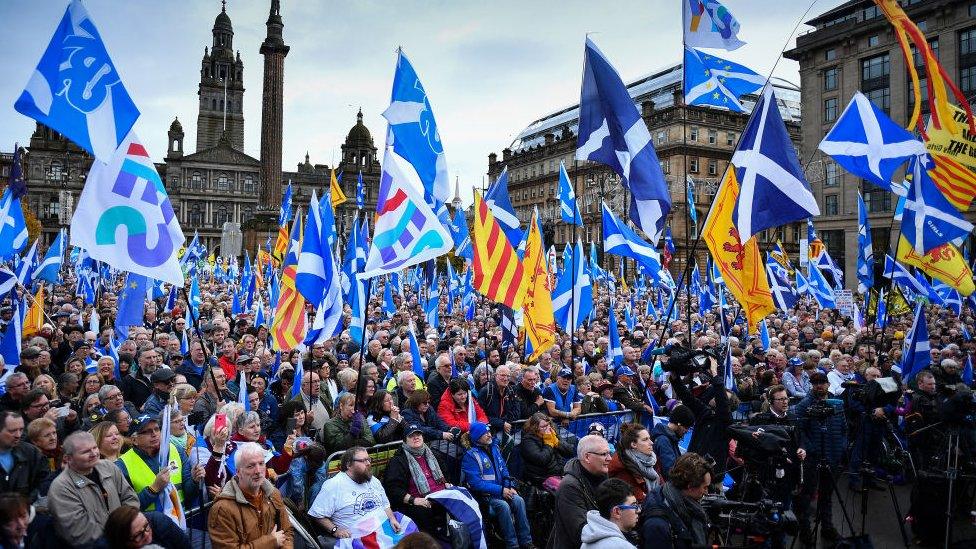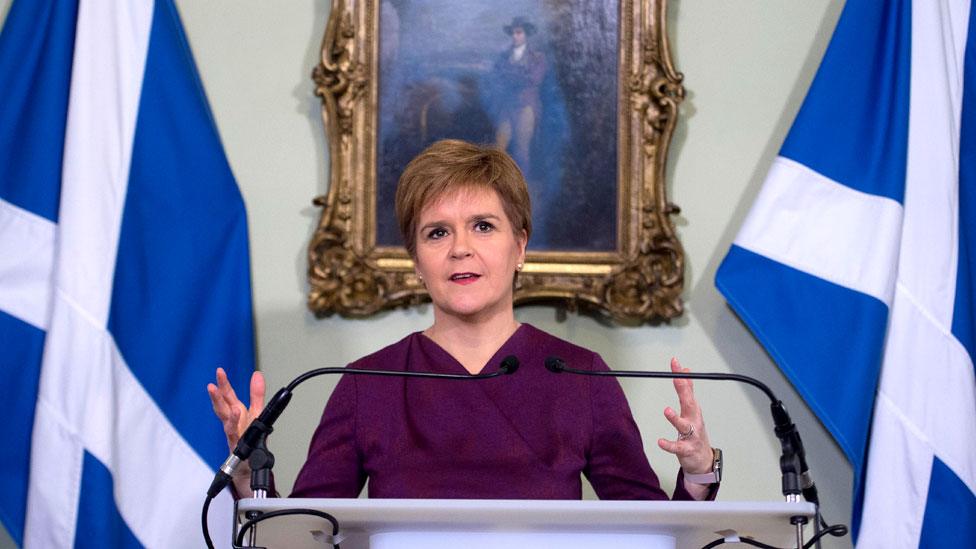Scottish independence: Ex-SNP minister Alex Neil calls for 'consultative' vote
- Published
Alex Neil says a consultative vote would put political pressure on the UK government
A former SNP minister has called for Holyrood to hold its own "consultative vote" on Scottish independence if such a move is declared legal.
Alex Neil argued a majority for independence would put huge political pressure on the UK government.
Mr Neil rejected suggestions that opponents would boycott such a vote.
SNP leader Nicola Sturgeon believes a referendum without Westminster agreement would not secure international recognition.
The UK government last week formally rejected Ms Sturgeon's call for a second independence referendum, refusing to grant a Section 30 order which paved the way for the previous vote in 2014.
Speaking on the BBC's Sunday Politics Scotland, former Scottish health secretary Alex Neil said a consultative vote, if judged legal, would force the hand of the government at Westminster.
He dismissed comparisons with Spain where an unofficial independence vote in Catalonia was boycotted by opponents, with only 42% of eligible voters taking part.
He said: "It's not a Catalonia situation where, according to unionists, the Spanish constitution made the Catalonian referendum unconstitutional and therefore boycotted it.
"There's a very big difference between boycotting an 'unconstitutional illegal' referendum and boycotting a legal referendum.
"The point I'm making is let's see if a consultative referendum, at the right time, could be legal."

Nicola Sturgeon addressed a pro-independence rally in Glasgow in November
Last week QC Aidan O'Neil said there were "good arguments" to be made for holding a referendum without UK government approval.
In a legal opinion commissioned by a pro-independence group, he said it was possible the Scottish Parliament already had the powers to do so under the Scotland Act, although that would have to be tested in court.
"The political reality is that if you ran a legal consultative referendum and the result was in favour of independence, the game's a bogey for the union because the political reality is that's it," Alex Neill added.
Mr Neill claimed a pro-independence result would be valid, even if a large proportion of voters boycotted such a referendum.
"The rest of the people who want to vote in a legal referendum, even those who do not want to boycott it but want to vote against independence, they can't be held to ransom because the Conservative Party and their cronies are going to abstain," he said.
'Dead in the water'
Nicola Sturgeon has said she will set out her government's "next steps" before the end of January.
A Scottish government spokesperson said: "The rejection by the UK government of the people of Scotland's right to choose is further demonstration of the need for Scotland's future to be put in Scotland's hands.
"We are keeping our options open on how to respond to the UK government's refusal to accept our mandate, endorsed by the Scottish Parliament, and will provide an update in due course."
Scottish Liberal Democrat leader Willie Rennie said a consultative referendum would be "dead in the water" before it started.
"People like me would not support it. We would see it as another distraction.... I can't see us wanting to support such an initiative," he told the same programme.
"It would be another distraction from the government to focus on the real challenges."
Pro-union campaign group Scotland in Union said the majority of Scots did not want "another divisive referendum".
The group's chief executive Pamela Nash said: "The nationalists should stop dreaming up new ways to divide people.
"Anti-UK campaigners don't have a positive case for separation, so all they want to do is stoke division."
'Sheer madness'
Elsewhere, another SNP veteran Jim Sillars has urged pro-independence supporters to "stop marching and start thinking".
Mr Sillars, a former deputy leader of the SNP, told Scotland on Sunday it would be "sheer madness", external to continue demanding a referendum this year.
He said: "We have hardly moved the numbers in favour of independence.
"And, until Brexit is done by the end of this year and we know the full details of any trade deal, it's impossible for the independence movement to construct a policy in relation to England, which is our largest market by far.
"Until Brexit is deemed to be done, and we can examine it in detail to see how it works in practice, we cannot devise a policy that will convince people to vote for independence in a substantial majority."
- Published14 January 2020

- Published23 November 2022
